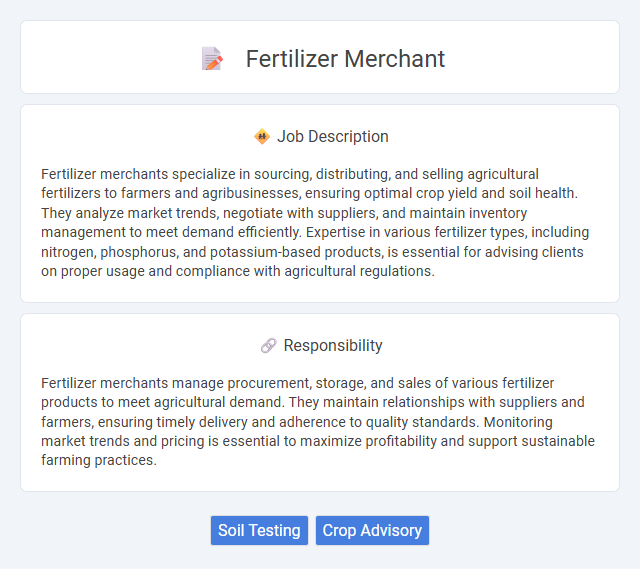
Fertilizer merchants specialize in sourcing, distributing, and selling agricultural fertilizers to farmers and agribusinesses, ensuring optimal crop yield and soil health. They analyze market trends, negotiate with suppliers, and maintain inventory management to meet demand efficiently. Expertise in various fertilizer types, including nitrogen, phosphorus, and potassium-based products, is essential for advising clients on proper usage and compliance with agricultural regulations.
Individuals with strong communication skills and a basic understanding of agricultural products will likely be suitable for a fertilizer merchant job. Those comfortable working in varied environments, from warehouses to outdoor markets, may find the role aligns well with their physical and social capabilities. However, people who prefer sedentary or strictly office-based work might find this job less compatible with their lifestyle and preferences.
Qualification
Fertilizer merchant positions typically require a strong knowledge of agricultural products, soil chemistry, and fertilizer types to effectively advise clients and manage inventory. Essential qualifications include a background in agricultural science, agronomy, or related fields, along with sales experience and strong communication skills to build client relationships. Proficiency in market analysis and supply chain logistics enhances the ability to provide competitive pricing and timely delivery to farmers and agricultural businesses.
Responsibility
Fertilizer merchants manage procurement, storage, and sales of various fertilizer products to meet agricultural demand. They maintain relationships with suppliers and farmers, ensuring timely delivery and adherence to quality standards. Monitoring market trends and pricing is essential to maximize profitability and support sustainable farming practices.
Benefit
Fertilizer merchants likely enjoy the benefit of steady demand due to the essential role fertilizers play in agriculture, which can lead to consistent income opportunities. They probably gain access to various product lines, allowing for market diversification and enhanced customer satisfaction. Furthermore, strong relationships with suppliers and farmers might result in valuable networking and potential business growth.
Challenge
Fertilizer merchants likely face challenges related to fluctuating market prices and supply chain disruptions, which can affect profitability. Managing relationships with both suppliers and farmers requires adaptability and strong negotiation skills. Navigating regulatory changes and environmental concerns may also pose ongoing difficulties in maintaining consistent operations.
Career Advancement
Fertilizer merchants can advance their careers by developing strong relationships with agricultural suppliers and farmers while gaining expertise in product knowledge and market trends. Progression often involves moving into roles such as regional sales manager, supply chain coordinator, or agricultural consultant, where strategic decision-making and leadership skills are essential. Continuous learning in agronomy and business management increases opportunities for higher responsibility and increased earnings.
Key Terms
Soil Testing
Fertilizer merchants play a critical role in recommending nutrient solutions tailored to specific soil conditions based on comprehensive soil testing results. Accurate soil analysis identifies essential macronutrients like nitrogen, phosphorus, and potassium, enabling merchants to provide precise fertilizer compositions that optimize crop yield and soil health. Integrating soil testing data with fertilizer product knowledge enhances sustainable agriculture practices by preventing nutrient imbalances and reducing environmental impact.
Crop Advisory
Fertilizer merchants play a crucial role in crop advisory by providing tailored nutrient management solutions based on soil health and crop requirements. They analyze soil properties and recommend the optimal types and quantities of fertilizers to enhance crop yield and quality. Their expertise supports sustainable farming practices by maximizing resource efficiency and minimizing environmental impact.
 kuljobs.com
kuljobs.com